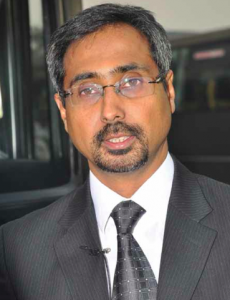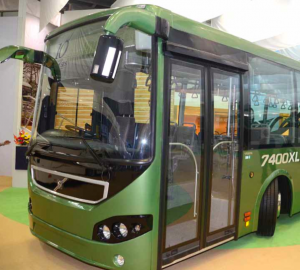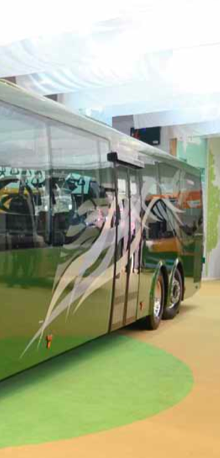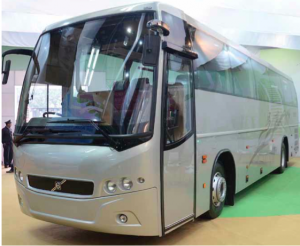
Asia to account for half of overall company business
The Indian bus industry has been revolutionized with the entry of global giant Volvo a decade ago. The company, synonymous with luxury travel in the country, has emerged a trend-setter in advanced technology, world-class safety and comfort, thus providing maximum value for money. Volvo’s Indian success story revolves around the expertise and leadership of Mr. Akash Passey, who was recently elevated from the level of Managing Director to Senior Vice President – Business Region International, and Chairman of the Board of Volvo Buses in India.
MOTORINDIA has immense pleasure to feature an exclusive interview held with Mr. Passey after he took charge of his new assignment in Sweden.
Excerpts from the interview:
MOTORINDIA (MI): What is your main goal in the fast-growing Asian bus market in general, and India in particular?
Akash Passey (AP): Volvo Buses has a clear and ongoing Asia strategy for the coming years. Asia remains a driver of growth, in which China and India have a major role. Already we expect Asia to account for 50 per cent of the total Volvo Bus transactions in the coming five years. Volvo Bus is actually the No.1 global manufacturer in the region in heavy buses, and we plan to remain ahead in the field. The growth we aim for by 2015, keeping industry cycles aside, is almost over 25 per cent each year. In India, as you know, we have already announced an investment of Rs. 400 crores and a multi-fold growth to follow, including entry into new segments. The aim in the region is to cater to the growth needs for bus transport. The sheer volumes being developed allow us the opportunity to develop new products here, built for Asia. In turn, these new products will have the opportunity to cater to specific new segments globally. So, as you see, Asia is a market opportunity as well as a source for new concepts and ideas.
 Already, as you know, the Volvo 9100 coach is symbolic of our plans to expand and be a part of a larger progress story in the region. At the same time, we are raising the standards we have set with new products like the Volvo 9400PX and Volvo 7400XL. In China, we have coach and city bus products that help build a strong presence there. Shanghai not only has around 6,000 Volvo buses but almost 14,000 buses from the Volvo stable. Just like in Curitiba, Bogota and Chile among other cities in South America, we should see the development of more and more cities with bus-based mass transport systems in Asia. Volvo plans to play a leading role here as a global leader in BRT. Asia, as you know, has some of the largest and fastest growing metros.
Already, as you know, the Volvo 9100 coach is symbolic of our plans to expand and be a part of a larger progress story in the region. At the same time, we are raising the standards we have set with new products like the Volvo 9400PX and Volvo 7400XL. In China, we have coach and city bus products that help build a strong presence there. Shanghai not only has around 6,000 Volvo buses but almost 14,000 buses from the Volvo stable. Just like in Curitiba, Bogota and Chile among other cities in South America, we should see the development of more and more cities with bus-based mass transport systems in Asia. Volvo plans to play a leading role here as a global leader in BRT. Asia, as you know, has some of the largest and fastest growing metros.
In India, we will be working to achieve the billion-dollar mark in the coming years, grow multi-fold, expand our industrial activity and enter new segments. However, beyond the mere growth in size and volumes the final mission is to be an integral part of the progress in the way India moves, ensuring with every solution we improve the level of safety, comfort, quality and care for the environment for passengers while providing economical transport solutions for our customers.
MI: You have become a trend-setter in developing advanced technology in the Indian bus transportation system. Do you see the trend extending to other Asian countries as well?
AP: I am proud to be part of an innovative company which has been driving quality of life across the markets it operates in. Globally, Volvo has led the change by introducing advanced technology to improve the performance and comfort in all its products, always in consonance with its core values of safety, quality and care for the environment.
We have developed products specific to the unique market requirements across major global markets. Volvo is synonymous with the BRT system in Bogota (Colombia) and Curitiba (Brazil) among many other cities, including Singapore, Hong Kong, and Shanghai. Our buses are the preferred vehicles by operators in these cities. In the last few years, Volvo has also successfully introduced the hybrid technology and has witnessed excellent response. These are the world’s first commercially viable hybrid buses. Today, we have the hybrid buses running in 20 cities across the world, and the trend will pick up in the coming years.
 Shanghai in China is running battery-operated city buses built by Volvo along with its JV partner Sunwin. This has been quite successful, and we are looking at deploying this technology on a large scale in other markets as well. The above instances highlight Volvo Buses’ approach in all markets in the world, including those in Asia. India and China will play an important role in new product development for Asian markets, and this trend will gain momentum in the coming years.
Shanghai in China is running battery-operated city buses built by Volvo along with its JV partner Sunwin. This has been quite successful, and we are looking at deploying this technology on a large scale in other markets as well. The above instances highlight Volvo Buses’ approach in all markets in the world, including those in Asia. India and China will play an important role in new product development for Asian markets, and this trend will gain momentum in the coming years.
The benefits of the new developments we will see in these two markets will percolate to all other parts of Asia, besides the rest of the world too!
MI: Although India has the largest rail network in the world, it carries six billion passengers per year compared to 51 billion by buses. Where do you see this trend heading?
AP: Bus transport will always be more flexible compared to trains and easier to implement at a far lower cost. Of course, both must grow, though I would expect buses to grow faster. India has just 1.3 buses per 1,000 people, which is among the lowest even when compared to developed countries, while being far lower than the over 10 buses per 1,000 for Brazil. So, frankly, the question in India is not about the train or the bus, but instead how can we offer sustainable transport to the country’s large population.
In my opinion, the growth of the nation will create a demand from all categories of markets for buses for public transport.
MI: Road transportation provides a lot of opportunities for PPPs. What are Volvo’s initiatives in this regard?
AP: There is a clear movement in adopting the PPP model and we see it being practised well in many States. It’s still in its early stages, but we expect to see faster growth in this category.
The Union Budget for 2012-13 refers to the Government proposal to encourage the PPP model. This is a welcome step and hopefully could benefit the institutional bus operators too.
The PPP model, in its various forms, can be a useful route in implementing successful transport systems. We are already witnessing significant activity on various aspects of public transport – metro rail, mono rail, road infrastructure, etc. Going forward, I do expect a lot of traction in the bus industry. With many of the State Governments/agencies cash strapped, support from private players will provide an impetus to this business. Both the intercity coach and city bus segments will benefit from the PPP model as the trend will gather pace in the coming years.
MI: There has been growing competition in the Indian bus segment. What measures are contemplated by Volvo to stay ahead of competition?
AP: Competition is always good as it gives customers an opportunity to compare products, costs and ultimately business benefits from a bus of their choice. In fact, competition helps us to get better returns on the efforts we put into our products, solutions and concepts. By not being the only player promoting the said concepts we now will see more voices and this will help expand the market for all.
Of course, the establishment we have set up in terms of our industrial establishment, products, customer relationship, market knowledge and people will hold us in good stead at the foundation. Most importantly, we today have the richest experience in the country when it comes to high-performing bus solutions.
 The Indian bus industry has evolved to a significant extent after the advent of Volvo Buses in the country. For the last four years or so, we have seen a lot of traction with the foray of new players into the Indian market. At the same time, the current players have been upping the ante by introducing new products.
The Indian bus industry has evolved to a significant extent after the advent of Volvo Buses in the country. For the last four years or so, we have seen a lot of traction with the foray of new players into the Indian market. At the same time, the current players have been upping the ante by introducing new products.
At the foundation, our aim remains simple. We plan to remain a step ahead and, most importantly, continue to lead progress in the way India moves by raising the current standards, as well as reaching out to new segments and playing a bigger role in this story.
MI: Most of the vehicle companies extend a helping hand to customers through in-house financing options. When can we expect Volvo venturing into vehicle financing?
AP: Globally, Volvo Financial Services is a business area in the group. This is a standalone entity with its own business approach and customer base. In India the Business Area has commenced activity with a local partner recently.
MI: Ending on a personal note, how has your journey been with Volvo since joining in in 1997?
AP: It’s not easy to summarise 14 years in short! For in the last 14 years with Volvo, I have had the opportunity to witness and experience almost every aspect of business development, brand development, business cycles, and changes in the customers, passengers and the market in all.
I feel fortunate to have been part of a journey starting from almost ground zero, when not many would share the vision, to today when we have all forces aligned to a shared future. It has been a rare opportunity and marked by close partnerships with colleagues, customers and various associates.
For me it’s immensely fulfilling to see that we have helped drive quality of life with every single solution we have brought into the country. It is because of this value creation that I truly cherish the fact that we have become a leading brand in the country with just 4,000 buses on road. When I look back at the years gone by, I see a series of events and people which I can best summarise in the words – courage, determination and creativity. These are the words that have led to where we are today – and not just bringing in a product.
Most importantly, with all that has gone by, we retain a high level of momentum. That we could introduce four new products in just one year during Auto Expo – the biggest ever in the industry till date – it’s a sign that we have not built a new market but have built a strong faith in this market.
Today the India operations are backed by a team of able and capable professionals, each of whom has been part of the India story of Volvo Buses.